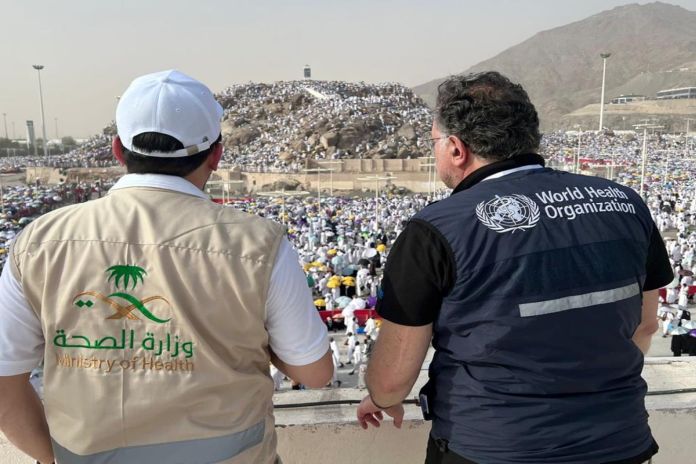UAE / SWITZERLAND – The World Health Organization (WHO) and the Kingdom of Saudi Arabia announced a new milestone digital health collaboration today to expand the Hajj health card initiative to support the roughly three million pilgrims who undertake the holy pilgrimage every year.
The Hajj health card, built on the WHO Global Digital Health Certification Network’s public key infrastructure, summarizes critical health information, such as medication needs, allergies, immunization status and pre-existing conditions. The card gives individuals agency over their own health information when they travel to Saudi Arabia so that they can provide authorized health providers access to accurate, up-to-date patient summary information and obtain personalized quality care.
“Today marks a notable progress in WHO’s support to Member States to expand access to safer and person-centred digital health tools for people to improve their access to quality health care when and where they need it,” said Dr Jeremy Farrar, WHO chief scientist. “We are thankful for the excellent collaboration with the Kingdom of Saudi Arabia, participating countries, and the WHO Regional Office for the Eastern Mediterranean, and look forward to further support building capacity and infrastructure in countries shifting to more digitized health systems.”
The Hajj is the largest pilgrimage in the world, drawing almost 3 million pilgrims from over 180 countries every year. Over 250 000 pilgrims from 3 countries, Indonesia, Malaysia and Oman, were issued Hajj health cards in 2024, as part of the pilot collaboration between WHO and Saudi Arabia. This test phase demonstrated that each country was able to use global standards to issue their own national versions of the card, enhancing the pilgrims’ safety and quality of care while undertaking the Hajj.
WHO and Saudi Arabia agreed to further collaborate to improve and expand upon the successful pilot programme for the Hajj health card. The expertise and support from the Saudi government and their digital implementing partner LEAN, will enable increased data security and essential technical support to additional countries joining the Hajj health card programme.
“This exciting partnership between the Kingdom of Saudi Arabia and the World Health Organization to expand the Hajj health card initiative enhances the safety and well-being of millions of pilgrims,” said Dr Hanan Balkhy, WHO Regional Director for the Eastern Mediterranean (EMRO).
“By leveraging digital health solutions, we strengthen quality of care, and help strengthen health systems in the Eastern Mediterranean Region and around the world.”
Eighty countries joined the WHO’s digital health certification network
WHO launched the Global Digital Health Certification Network (GDHCN) in 2023 building on a successful collaboration with the European Union and other partnering countries to support COVID-19 vaccination certificates. The GDHCN now includes over 80 WHO Member States that have established systems to verify the authenticity of health information between each other, leveraging a new global ISO standard, IPS – the International Patient Summary.
The GDHCN is based on a robust public key infrastructure (PKI) encryption system that keeps health credentials verifiable and secure, allowing national authorities and health providers to trust the authenticity of health documents across borders without compromising individual privacy.
The initiative aims to bring a digital health future where people can carry internationally recognized health credentials for improved travel and health care access. This enables greater access and control for people over their health information with the ability to select and decide which health information should be shared when seeking care domestically or abroad.
By joining WHO’s certification network, countries can cut down on administration processes, making border controls more efficient and health visits better informed. The global network lays the groundwork for long-term improvements in international health collaboration, enabling future use-cases such as cross-border e-prescriptions, insurance, and even telemedicine.





